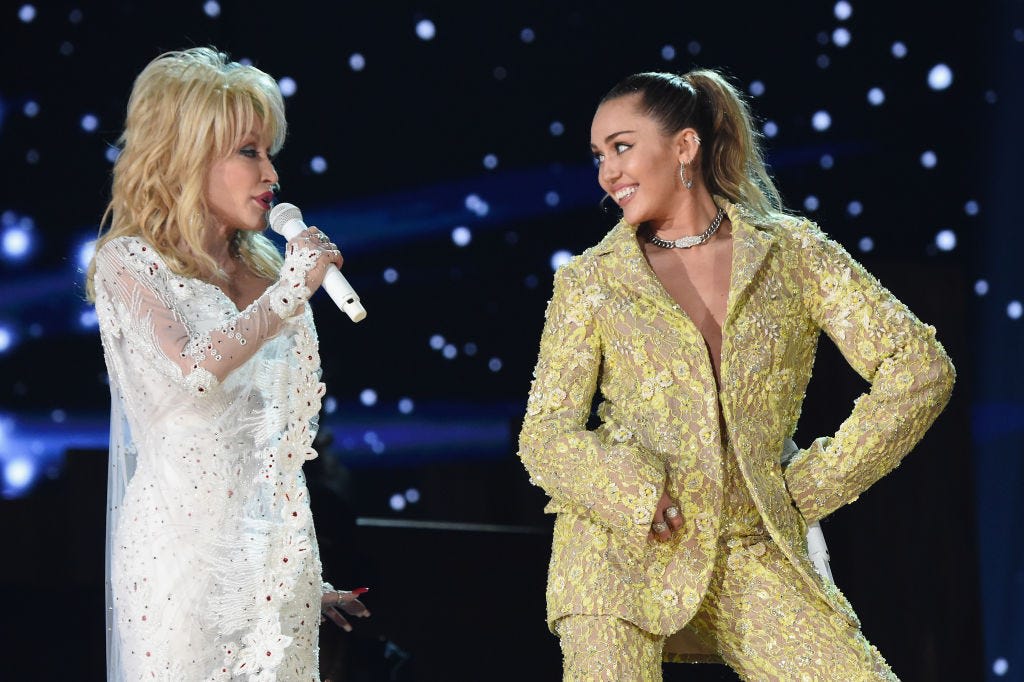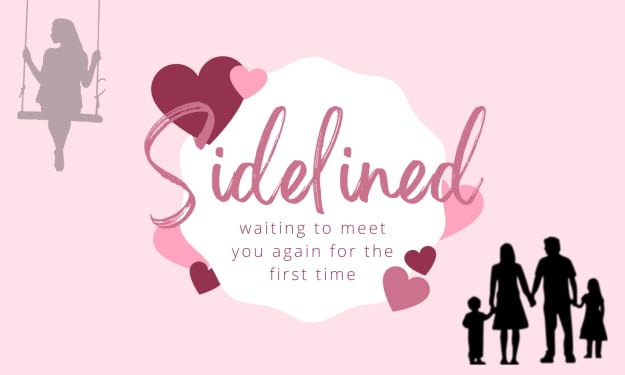Dolly Parton and Miley Cyrus are Trending Again. Here's Why That's a Bad Thing.
A uniquely American trend comes for a beloved duet.

When Miley Cyrus and her godmother, Dolly Parton, released their duet “Rainbowland” in 2017, they had no idea of the controversy it would cause. “It’s really about if we could love one another a little better or be a little kinder,” Parton told people in an interview promoting the new song. Little did she know, it would become one of the biggest controversies on the internet and in a Wisconsin school district.
Now, the 2017 bubblegum-sweet duet is at the center of a ban affecting children across Waukesha county.
It all began when first-grade teacher, Melissa Tempel chose the song for her students to sing at their spring concert. The Heyer Elementary educator thought it was the perfect song to squeeze in between the lovable lyrics of “It’s a Small World” (sung in Spanish) and “Here Comes the Sun,” by the Beatles.
“My students loved it immediately,” the teacher told a reporter with CNN’. “It isn’t just a song…We’re trying to support inclusivity. The love and acceptance piece, and being who you are, I don’t think there’s anything political about that.”
The Waukesha country school board disagreed, banning the song from the 1st-grade concert and labeling it as a direct violation of their “controversial issue” policy, which aims to remove all controversial content from the county’s school. It’s a decision that’s created a storm, and another nail in the coffin of the regressive American social experiment that is pulling the country back into the dark ages.
The U.S. is a country terrified of rainbows.
The “Rainbowland” ban is only the latest casualty in an increasingly worrying trend of censorship that is gripping schools (and states) across America. Aimed at erasing LGBTQ+ topics and issues in classrooms, these censorship bans have lowered their aim at everything from books to curriculum, and classroom conversations to, now, generic, mass-produced pop songs.
Last year, Waukesha country schools also told teachers to remove any rainbow imagery from their rooms and to rid themselves of any lanyards which showed rainbow colors or designs. Before the “Rainbowland” ban, teachers in the district were also encouraged to avoid using nicknames or pronouns requested by students.
States like Florida and Delaware have followed suit, with their well-publicized “Don’t Say Gay” bans and the expanding legislation that restricts educators from discussing or displaying any sort of gender and sexuality-related topics or issues. Tennessee took things even further with a blanket ban on all drag-classified performances.
From the outside looking in, America looks like a country terrified of rainbows and the appearance of “difference.” What is commonly accepted (not encouraged, accepted) in other countries creates puritanical responses in the people who are supposed to be “leaders of the free world”.
Watching state, municipal, and national governments alike create bans restricting education, creative bans, and the personal lives of their citizens forces one to question what freedoms Americans really have.
It makes no sense. The regressive reaction smack of fear and ignorance. One needs only look back to Waukesha county and the students of Heyer Elementary.
After the banning of “Rainbowland,” Tempel and fellow teachers rallied together to select the much-beloved anthem, “Rainbow Connection,” as a replacement for their spring concert. This hopeful anthem, made famous by Jim Henson’s swamp-singing Kermit the Frog, was immediately banned by the school board — for its mention of rainbows alone.
Parents, school staff, and administrators had to rally and petition the school board to get the vintage family favorite approved. (After proving the song had nothing to do with an “LGBTQ agenda”.)
If one didn’t know better, one could be convinced that America is spiraling back into the dark ages of superstitious ignorance. How else could one explain the banning of a Muppet’s song out of hand…simply because of the mention of rainbows?
How the schools are responding.
By and large, educators like Tempel are doing what they can to make their educational spaces safe, inclusive, and educational for all of their students. According to Samantha Siebenaller — a parent of a child in Tempel’s class —, the teachers have a “dedication to creating an environment where inclusion thrives in spite of the [school board].”
Some remain rebellious, displaying rainbows proudly and answering the questions that their students have as delicately as possible. Others find ways to share their stories so they can raise awareness about what is happening in American schools.
Most of them see their jobs as they ever did, to foster a new, kinder generation of human beings who can make this world better than they left it. “[My job] is making sure my students feel safe and supported at school, and that their identities are appreciated, no matter how they identify,” Tempel told CNN.
It’s a noble sentiment, but a sad one.
For every teacher like Tempel, one has to wonder how many there are that support these regressive bans. How many of her co-workers, in the same space working with the same children, have entirely different (protected) views that they are forcing on children who are trapped in the middle of a war they don’t understand?
It is a turbulent time indeed when even a Kermit the Frog song is deemed too “controversial” to make the cut.
Where will the line be drawn?
Ultimately, parents will be the deciding factor. Their involvement in schools, and their involvement in local and national elections, will decide the course of this war and what children in the U.S. are granted access to. Where will their final decision lie? Only time will tell.
© E.B. Johnson 2023
About the Creator
E.B. Johnson
I like to write about the things that interest me.






Comments
There are no comments for this story
Be the first to respond and start the conversation.